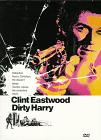 :
Study
Questions: Week Seven
:
Study
Questions: Week Seven :
Study
Questions: Week Seven
:
Study
Questions: Week Seven
The Hero as Demi-God.
Dirty Harry (1971).
High Plains Drifter (1985)
 1.
In what ways is the character of Harry Callahan similar to the Stranger in Fistful
of Dollars?
1.
In what ways is the character of Harry Callahan similar to the Stranger in Fistful
of Dollars?
2. To what degree is this early 1970s film a backlash against counter culture attitudes and life styles (particularly feminism, sexual liberation, and affirmative action policies)?
3. What is the significance of the robbery Harry foils in the opening of the film? It has nothing to do with the main plot, but it may establish Harry's character.
4. How does Harry's rebellion against authority differ from No Name's? How are their motives different?
5. How does Dirty Harry get his name? Be sure to note all the reasons given (including the fact that he is mistaken for a peeping Tom).
6. In your summary of the film, Pauline Kael describes Dirty Harry as fascist. What do you think she means by the term, and do you agree or disagree? What, in your opinion, is the political massage of the film?
7. Why has Harry lost his wife? Or to put the question differently, why does he need to work alone?
8. In what ways is the demonic killer a compositie of all the social trends of the 1970s? Consider, for a start, his belt buckle.
9. What prompts Harry to throw away his badge at the end of the film? Could it have anything to do with the fact that the Mayor is played by John Vernon who would later reappear as the nightmare college dean in perennial favorite, Animal House?
10. In what ways is the figure of Dirty Harry similar to and different from other heroes of Hollywood detective thrillers that you have seen? Consider especially those made in the 1940s, 1950s and early 1960.
11. Why does the Stranger have no name? What is the significance of the dying Stacey's question: "Who are you?"
12. Is there any significance in the fact that the Stranger faces three opponents at the beginning and at the end of the film?
13. How do you interptet the meeting with Halley (the mistress of Morgan and Stacey) at the beginning of the film?
14. What is the moral cost of middle-class respectability in High Plains Drifter?
15. Why is the town painted red? Is this serious or a grotesque joke?
16. Are we to take the film literally, or is the film having fun with the conventions of the western genre?
17. What is the dramatic effect of the long, lingering shots of staring faces?
18. Why is the memory of the beating so central to the film?
19. How is the stranger different from the archetypal western hero?
20. What, exactly, is the relationship between the Stranger and the dead Marshall Duncan?